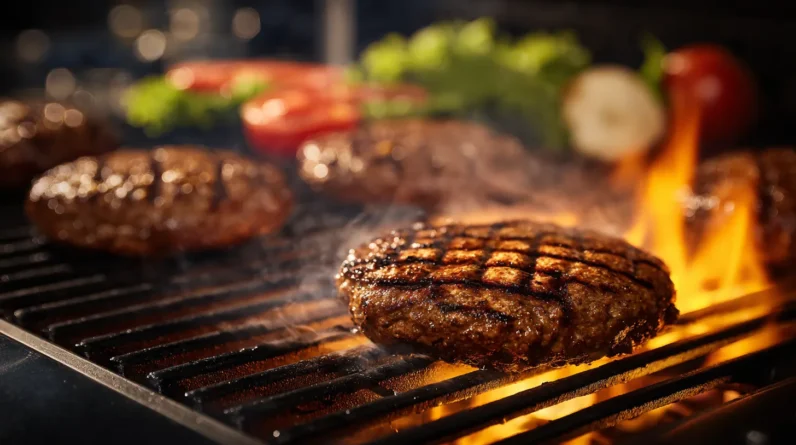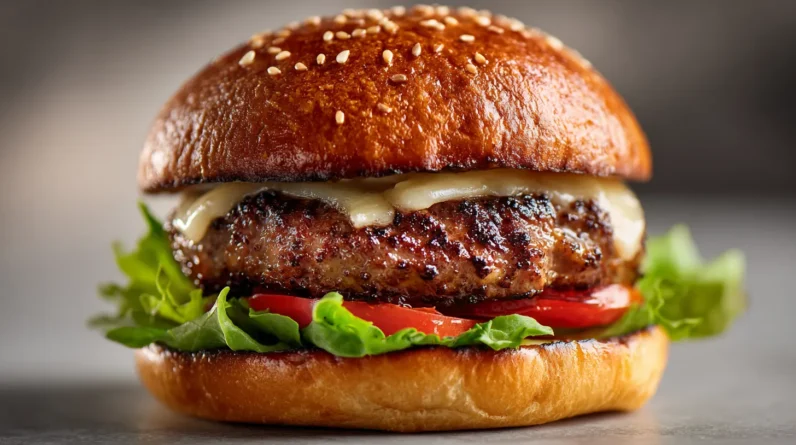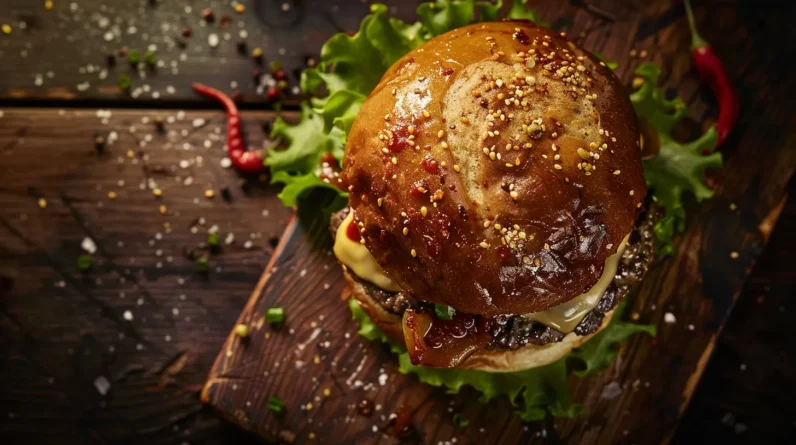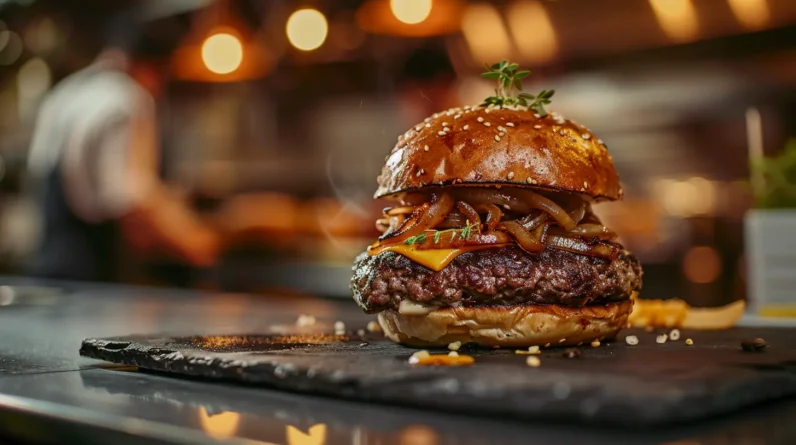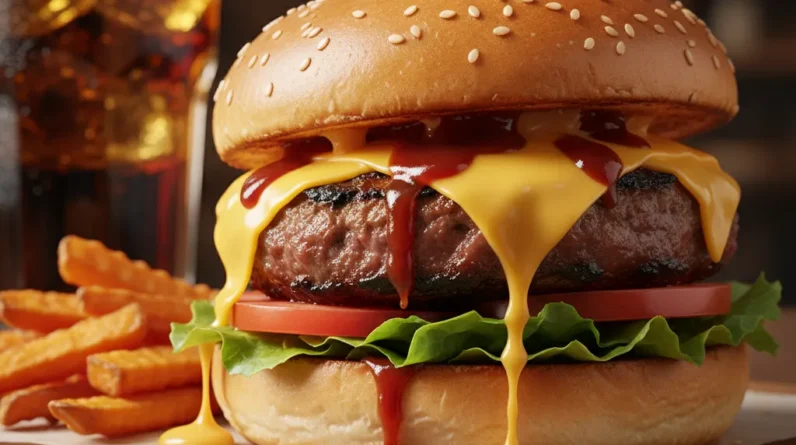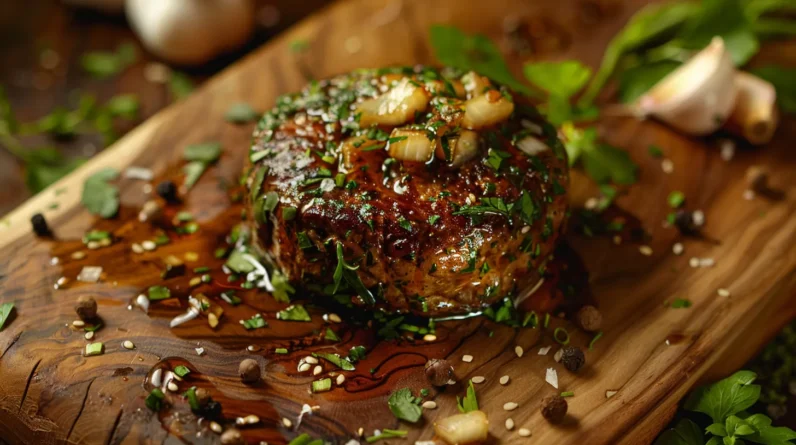
Marinades play an essential role in elevating beef burger flavor through three key mechanisms. First, we’ve found that acidic components like vinegar or citrus juice break down protein structures, allowing deeper flavor penetration. Second, oil-based ingredients help distribute fat-soluble compounds while maintaining moisture throughout the meat. Third, aromatic seasonings and spices contribute complex flavor profiles while potentially providing antimicrobial benefits. We recommend a ratio of 1 part acid to 3 parts oil, with seasonings comprising 10-15% of total volume, marinated at 34-40°F for 30-60 minutes. The science behind marinade composition reveals even more fascinating ways to transform ordinary burgers into exceptional creations.
Why Marinate Ground Beef
Marinating ground beef serves multiple purposes beyond basic flavor enhancement. We observe that marinades penetrate the meat’s protein structures, creating enzymatic reactions that break down muscle fibers and connective tissues. This tenderizing effect helps maintain moisture during cooking, reducing the risk of dry, overcooked burgers.
We’ll achieve ideal results by incorporating acidic components like vinegar or citrus juices, which denature proteins and create gaps for flavor molecules to enter. Oil-based ingredients carry fat-soluble flavors deeper into the meat while helping to distribute water-soluble compounds. Additionally, we’re introducing antimicrobial benefits when using ingredients like garlic, ginger, or certain herbs, which can inhibit bacterial growth. Salt in marinades triggers protein restructuring, improving the meat’s moisture retention and creating a more satisfactory final texture in our burgers.
Essential Marinade Base Ingredients
Three fundamental components form the foundation of any effective beef burger marinade: an acid, an oil, and seasonings in precise ratios. We’ll typically use one part acid to three parts oil, with seasonings comprising 10-15% of the total volume. The acid component, such as vinegar, citrus juice, or wine, tenderizes the meat by breaking down muscle fibers and connective tissues.
The oil component, preferably a neutral-flavored variety like canola or grapeseed, serves as a flavor carrier and helps maintain moisture throughout the cooking process. It also creates an emulsion when combined with the acid. For seasonings, we’ll incorporate both water-soluble (salt, sugar) and oil-soluble (ground spices) compounds to guarantee complete flavor distribution throughout the ground beef mixture.
Time and Temperature Factors
Proper timing and temperature control prove critical for achieving perfect marinade penetration in beef burgers. We’ve found that marinating ground beef requires 30-60 minutes at refrigerated temperatures between 34-40°F (1-4°C). Longer periods can result in protein breakdown and mushy textures.
Temperature management directly affects marinade absorption rates. We must avoid room temperature marination, as it promotes bacterial growth in the 40-140°F (4-60°C) danger zone. When we’re working with frozen patties, we’ll need to thaw them completely in the refrigerator before marinating to guarantee even flavor distribution.
For best results, we’ll place our burgers in a sealed container or zip-top bag, removing excess air to maximize meat-to-marinade contact. The marinade-to-meat ratio should maintain 1/2 cup of marinade per pound of ground beef.
Popular Global Marinade Combinations
Throughout global cuisine, distinctive marinade combinations have emerged that showcase regional ingredients and cultural preferences. We’ve identified several standout formulations: East Asian marinades typically combine soy sauce, rice wine, ginger, and sesame oil; Mediterranean versions favor olive oil, lemon juice, garlic, and herbs like oregano and rosemary; Latin American preparations often incorporate lime juice, cilantro, cumin, and chilies.
In South Asian traditions, we’ll find yogurt-based marinades with turmeric, garam masala, and ginger, while Middle Eastern combinations feature pomegranate molasses, sumac, and za’atar. North American variations commonly blend Worcestershire sauce, mustard, and brown sugar. Each regional blend doesn’t just add flavor—it creates chemical reactions that tenderize the meat through enzymatic processes or acid-based breakdown of protein structures.
Tips for Maximum Flavor Absorption
Building on these global marinade combinations, maximizing flavor absorption requires precise technique and timing. We’ll achieve ideal results by following key principles of meat science and molecular gastronomy.
The protein structure of ground beef presents unique challenges for marinade penetration. We’ve found that these techniques greatly enhance absorption:
– Score the formed patties with shallow crosshatch patterns (1/8 inch deep) before marinating to increase surface area and create channels for flavor penetration
– Maintain a marinade temperature between 34-40°F (1-4°C) to keep meat safe while allowing protein bonds to relax and accept flavoring compounds
– Limit marinade time to 30-45 minutes; longer periods can break down meat proteins excessively, resulting in mushy texture
For thick patties, we recommend gently massaging the marinade into the meat while forming the burgers to guarantee even distribution.
Conclusion
Through our exploration of burger marinade science, we’ve uncovered how these flavor-enhancing solutions act as alchemists’ potions, transforming ordinary ground beef into complex gastronomic experiences. The marriage of acid, oil, and aromatics penetrates the meat’s cellular structure like microscopic flavor ambassadors. We’ve demonstrated that precise timing and temperature control, combined with carefully balanced ingredient ratios, release ideal flavor absorption, elevating the humble burger to a canvas of culinary sophistication.


